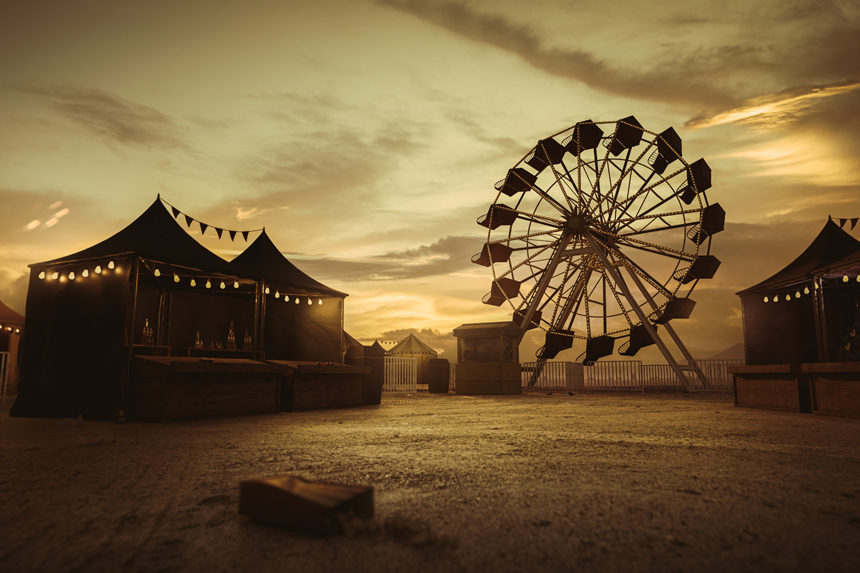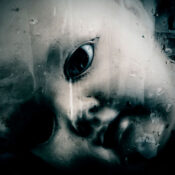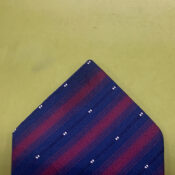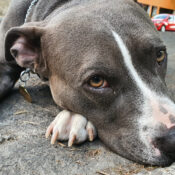Somewhere along the wend of the highway was a consortium of red-striped tents, their pinwheel colors whisked into dazzling streaks. Abe saw the night circling its arms around the frenzy of lights, slipping fingers between ice cream stands and games of horseshoe and curving its palms around Tilt-a-Whirls and Ferris wheels and tickling the heels of zebras and camels and filling the space beneath the flying forms of leotard-clad trapeze artists and lending its shadows to the freak shows and sideshows for stranger, more canted shapes. He imagined that’s how the circus traveled — ladled up by the cupped hands of the night and swept off without a whisper, shining one moment in a new-cut cornfield and vanished the next, leaving little but paper bags of spilled popcorn and thousands of footprints in the dirt. Nobody existed there, whether or not they wanted to. It was a place to escape the dust of the world, to not-be, to be-not.
They were farmers, ranchers, librarians and teachers, car mechanics and drugstore owners and barbers, small-town folk who had never seen more color than the painted insides of a soda shop (closed for a year now) or the yellows and greens of the corn fields that were the same colors as their local baseball team. They were drawn to the brilliance and freakishness; girls in printed collared dresses who whispered and tittered and rebelliously let an unfamiliar man paint their faces with cat’s stripes and stars and butterfly wings, and licked pink and sticky cotton candy from their fingers, clutching each other as they passed the Alligator Man, and the snake charmer and the garish, toothy banners over the dime museums, both disturbed and enthralled. Boys in cuffed jeans and white socks and greased hair shot toy bullets from toy guns and won toy figurines, and admired and coveted the Bearded Woman’s hairy chin, and jostled and pointed and denied being afraid of the carpet clowns prowling between the tents.
There were groups of them, the young men, who did their own prowling, as if they themselves owned the night and the shadows. A tall fellow in a green jacket emblazoned with a blocky yellow E over the breast, slipped back up with the rest of the group, and was quickly slapped on the back and barraged with shouts. They were rowdy that night, pushing and shoving and daring each other to flick popcorn kernels at the lions and taunt the bally talkers who flourished their hands and hats at every turn.
“Don’t go off again, Abe,” cried one with a grin wide enough to eat a horse. “We might never find you again. Lord, this place is like a maze, isn’t it? Feels like we’ll turn the corner and keep goin’ on until the edge of the world.”
“It does,” agreed Abe, though he’d walked out past the edge of the light and seen where the darkness fell, and he knew it did not go on forever, though he wished it might, and it seemed powerful enough that it could. If they didn’t leave, if they remained here and kept their eyes on the inside and not where the night crept in, then maybe it would last a little longer.
“Did you hear about Betsy? She nearly fainted in the dime museum.”
“I heard she threw up all over.”
Abe laughed easily. “Betsy would.”
“Oh yeah?” said another, who had fierce eyes and a fancy for Betsy. “Just you try.”
Abe shrugged a shoulder. “I’m not scared of any circus sideshows.”
And he said he wasn’t, but he’d heard what Betsy had seen, too. It was that tent by the Man-Dog, the one that had the great big sign over it that read Museum of Oddities with the picture of a cut-open skull showing a cross-section of spaghetti-brain and a skeleton with three arms and a jar full of what looked like fingers or lizards. It was off a bit from the music and the tides of color, closer to where the outside ring of the footprint lay — it gave him that awful, thrilling chill of a thing unquiet and lurking.
They rode the Tilt-a-Whirl twice, and won prizes and ate roasted peanuts gemmed over with salt enough for a heart attack, and James lost terribly at the ring-toss but Abe won a toy tiger striped just like the tents and they got into a row, and by the time they found the Museum of Oddities they were dehydrated and light-headed and close to calling it a night, but oh there was still so much to see and do and the bally talkers were persuasive and it was only a penny to see the tattooed woman and dime for the sword swallowing show where a bare-chested man really did swallow swords, some of them curved or bent, and all of them sharp (as he demonstrated by cutting an apple).
“Come see the Fiji Mermaid!” crowed the man outside the Oddities tent, in his headache-red suit and tall hat and thick mustaches that didn’t quite hide the glint of his own oddity — he was missing part of his nose, as if it’d been cleanly scooped out of his face with a spoon and left to grow over with the remaining skin and tissue. “Touch the tooth of the long-extinct dinosaur, lay your eyes upon oddities never before seen with the eyes of man! Two-headed babies! Cyclops cats! Get your fortune told by the famous Looking-Glass!”
“Come on!” shouted the other boys. “Abe, you’ll do it, won’t you? Hurray Abe!”
The bally talker coaxed him in with smiles and further ballyhoo (mummified pharaohs from Egyptian tombs! The sandals of John the Baptist himself! The stake that killed a vampire!) and in a twinkling Abe was liberated of his last dime and ushered through the flaps of the striped tent and into the darkness inside. It was quieter here, the jarring tunes outside in the night muffled by the tent canvas, and there were only a handful of little electrical lights above the oddities themselves, giving them all grotesque shapes and gashes of shadow-made smiles. There wasn’t anyone around, either, but he walked through the museum alone, through narrow, blackened hallways that never seemed to end, though he only went around and around in a spiraling circle, like a snail’s shell, closer and closer to the center. There was, indeed, a bloody wooden stake with bits of hair on the end, and the twisted body of a shriveled mermaid. Abe paused at the stuffed cat that had only one eye, right in the middle, and touched the dinosaur tooth, and reached over the ropes to touch the mummy, though a little sign told him not to. As he went they got stranger and stranger. A skeleton with three legs grinned and danced shoulder-to-shoulder with glass bottles filled with chemicals and tumors and six-fingered hands. He found the two-headed baby, and a book bound with human skin, and dentures that all chattered in a row, and as he went his heart beat harder and harder, and his hands grew clammier, and the space behind his eyes hurt.
He came to the last room. There was a painted sign that read Get your fortune told by the Looking-Glass! Place your hand on the print and it will see your future! and when Abe ducked into the room he found it empty but for a single oddity on display in the middle, lit up by a single flickering lightbulb and surrounded by a rope. It was a glass jar on a pedestal with some tumescent shape inside, with wires and electrical-looking gadgetry trailing out to a machine at its base.
There was that unquiet feeling again, as if he were being watched and appraised and evaluated. He checked the dark corners of the tent before he slipped inside all the way, and then laughed softly when he saw. It was a pair of eyes, golden-brown ones, hanging suspended in the greenish-yellow formaldehyde, enlarged by the curve of the glass jar. Abe stepped to the side. The eyes followed. Of course it was just a trick of the light — they did that on purpose. They were no more alive than the skeletons and the taxidermy animals. But still…they were awful, weren’t they? Engorged and bulging, and there wasn’t a mouth to go along with them, but he could have sworn they were grinning, somehow, and he stepped closer with an awful sort of fascination. They stared back through the thick glass, distorted by the curvature no matter which way he looked at them. He could see the veins patterning the gel-like whites and the tendrils that were nerves and blood vessels trailing out the back like the wires that rested on the surface of the chemicals beneath the lid. What a color they were, like melted bronze, and God he was sweating, the tent was hot, and the eyes were staring staring staring and he was staring back.
He did not want to, oh he did not want to, he wanted to run off and hear the music and the shouting and smell the fried food and never know what his future held, but he couldn’t help it, because the eyes were watching, and with his gaze still locked in place, he put his hand on the metal plate of the machine. It settled, clicked, whirred, and he almost ran again, then, but no, it was too late now, for the eyes were watching him closely and they were watching his every move and if he ran now they would follow him, out of the tent and out into the night and he knew he’d never get them out of his head and that he’d always wonder what they would have said to him, so he kept his hand firmly pressed to the machine as it did its work and not half a minute later, with some further clicking and grinding of gears, a tiny slip of paper fell out into a tray. He reached for it without looking, loathe to break away from the dilated pupils, and held his breath as he held the paper up to the light to read the cramped printed words:
Don’t look away.
Oh, God, thought Abe, and he realized with horror that it was already too late too late too late; he’d looked away to read and by the time he looked up again he knew it had happened. He wanted to scream but he hadn’t a mouth to scream with and he wanted to run but he hadn’t legs to run with, and all he could do was watch through the watery curve of the jar thinking of how those eyes had swallowed him whole while the thing that was wearing his body walked away into the dark folds of the night, a slip of paper falling from its hand and settling on the ground as it left the glass jar behind on its pedestal to stare fixedly out with sea-colored eyes, and the machine whirred and clicked in the dark.
Become a Saturday Evening Post member and enjoy unlimited access. Subscribe now




Comments
A creepy story well told, with lots of detail to make it more so. An appropriate pre-Halloween read for sure.